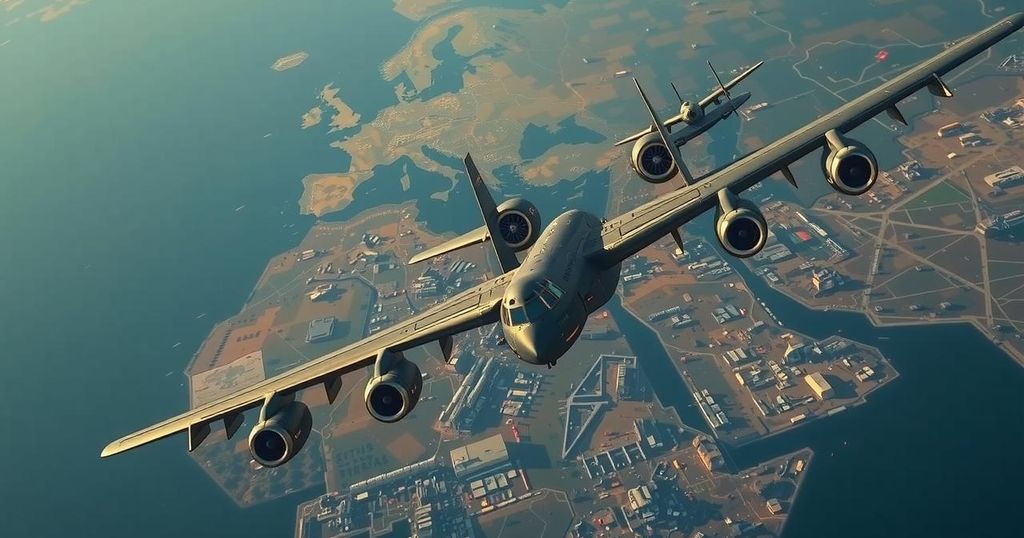Global news
AMERICA, ASIA, AV, AVICHAY ADRAEE, BAALBEK, CONFLICT, DO, DOURIS, GAZA, GAZA STRIP, HAMAS, HEZBOLLAH, IDF, IRAN, ISRAEL, KHOMEINI, LEBANON, MIDDLE - EAST, MIDDLE EAST, MIDDLE EAST AFFAIRS, MILITARY, MOHAMMED REZA PAHLAVI, NORTH AMERICA, OF SPIES, SHAH, TEHRAN, TEL AVIV, THE PENTAGON, UNITED STATES, US, WASHINGTON
Fatima Khan
0 Comments
Escalating Tensions in the Middle East: US Deploys B-52 Bombers as Warning to Iran
The United States has deployed B-52 bombers to the Middle East in a warning to Iran, while Israeli forces urge evacuation in regions near Hezbollah targets. In Iran, demonstrations mark the anniversary of the 1979 hostage crisis, reflecting ongoing animosities. The detention of Iranian-American journalist Reza Valizadeh further exacerbates tensions, as Iran’s leadership threatens decisive responses against perceived aggressions from the US and Israel.
In a significant military maneuver, the United States has deployed B-52 bombers to the Middle East as a direct warning to Iran amid escalating tensions in the region. The Pentagon stated that this deployment seeks to safeguard American personnel and interests following a series of confrontations involving Iran and its affiliated groups. Concurrently, Israeli forces have issued evacuation orders for specific regions in eastern Lebanon, namely Baalbek and Douris, indicating forthcoming strikes against Hezbollah positions.In a separate incident, Iranian authorities commemorated the 1979 hostage crisis with demonstrations in Tehran, unintentionally highlighting the long-standing animosity between Iran and the United States. The protests were marked by slogans condemning both Israel and the US, illustrating the enduring frictions that characterize their relationship. Additionally, the detention of Iranian-American journalist Reza Valizadeh has been raised as a contentious issue amidst these heightened tensions, with the US State Department acknowledging that Valizadeh has reportedly been held in Iran for months. This development unfolds against the backdrop of threats from Iran’s leadership to respond decisively to any aggression from Israel or the US. Observing these events, it becomes evident that the military buildup and diplomatic strains between these nations continue to escalate, casting a shadow over the Middle East’s already tumultuous geopolitical landscape.
The recent deployment of B-52 bombers by the United States is part of a broader strategy aimed at deterring Iranian aggression in the region. The conflict has historical roots, particularly dating back to the 1979 hostage crisis, when Iranian revolutionaries seized the US embassy in Tehran. This act led to a prolonged rupture in diplomatic relations between the two nations. Today, as tensions rise over military actions involving Iran and its proxies, the US feels compelled to strengthen its military presence to ensure the safety of its interests and allies. Furthermore, the Israeli military’s operations against Hezbollah and the Iranian-held territory further complicate the situation, reflecting the complex web of alliances and enmities in the Middle East.
The deployment of B-52 bombers serves as a stark reminder of the escalating tensions in the Middle East, particularly between the United States and Iran. This military action, alongside the Israeli strikes and Iranian protests, underscores the fragile state of affairs in the region. With both nations bracing for potential conflict, the geopolitical landscape remains precarious, warranting close observation as events continue to unfold.
Original Source: www.france24.com




Post Comment